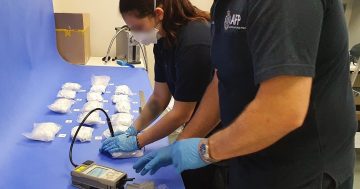
Organised crime groups target university students to be money mules by offering easy cash. The AFP recently arrested six Chinese nationals – including two 18-year-old university students – for allegedly being involved in laundering money for a syndicate. Photo: AFP.
As 2024 classes get underway, university students are being warned about a trend orchestrated by organised crime groups.
The new #DontBeAMule campaign has been launched by the Australian Federal Police (AFP) and other law enforcement agencies to raise awareness about criminals recruiting financially vulnerable students – particularly from overseas – as money mules.
A money mule receives money from a third party into their bank account, transfers it into another account and gets a commission for it.
“Criminal networks are targeting and attempting to recruit university students as money mules, which may be due to their financial situations and their active search for part-time employment,” an AFP statement explained.
“International students have added vulnerabilities due to language barriers and their limited knowledge of Australian criminal law.”
The campaign being rolled out across 39 universities – including the Australian National University, University of Canberra, the Australian Catholic University and University of Wollongong – includes a digital information pack, marketing material on campus and advertising on social media.
It will be translated and delivered in seven languages: Mandarin Chinese, Hindi, Punjabi, Nepali, Spanish, Vietnamese and Thai.
AFP Detective Superintendent Tim Stainton said criminals attracted students through job ads that required them to have no experience and offered weekly payments and flexible work arrangements.
“Often the only requirements for the job are access to a mobile phone or computer and an Australian bank account to receive and transfer funds at the direction of the criminal group – this is a major red flag,” he said.
“If a job opportunity seems too good to be true, then it probably isn’t legitimate. If you are being offered significant sums of money to just move money through your bank account, then it is likely you are committing a criminal offence.
“You can do your due diligence by researching the business to see if they have an online presence, check if they have legitimate contact details and find out if they’re based in Australia.”
In addition to posting the job ads on platforms, such as online classifieds and social media, police are seeing criminals proactively contacting students face-to-face and through community networks to recruit more money mules.
Recruitment can occur through social media platforms, instant messaging apps, email, pop-up ads and in-person.
Authorities encourage everyone to be sceptical when approached by someone you don’t know, especially if they’re offering easy money for limited work.
Det. Supt Stainton warned that a money mule, unwittingly or not, was complicit in a money laundering offence which could lead to an arrest and charges by police.
“Money mules may try and convince themselves that what they’re doing is a victimless crime which gives them a quick paycheque, but this couldn’t be further from the truth,” he said.
“Moving money for criminals gives these syndicates access to their dirty money and helps fund future criminal ventures such as drug trafficking, child exploitation, cybercrime and cyber-enabled fraud.
“Having a criminal record can impact your ability to obtain employment, travel to certain countries and if you are an international student, it can adversely affect your ability to retain an Australian student visa.”
Tips for staying safe from money mule recruitment scams:
- Don’t engage with online posts offering large sums of money
- Don’t accept message requests from people you don’t know. If you receive a message from a friend with a link to click, speak to them in person before you respond
- Don’t share banking and personal details with anyone you don’t know or trust
- If someone asks to use or ‘borrow’ your account, say no
- If you suspect something is not right, reject the offer
If you are a victim of cybercrime, report it to police using Report Cyber.
If there is an immediate threat to life or risk of harm, call 000.















